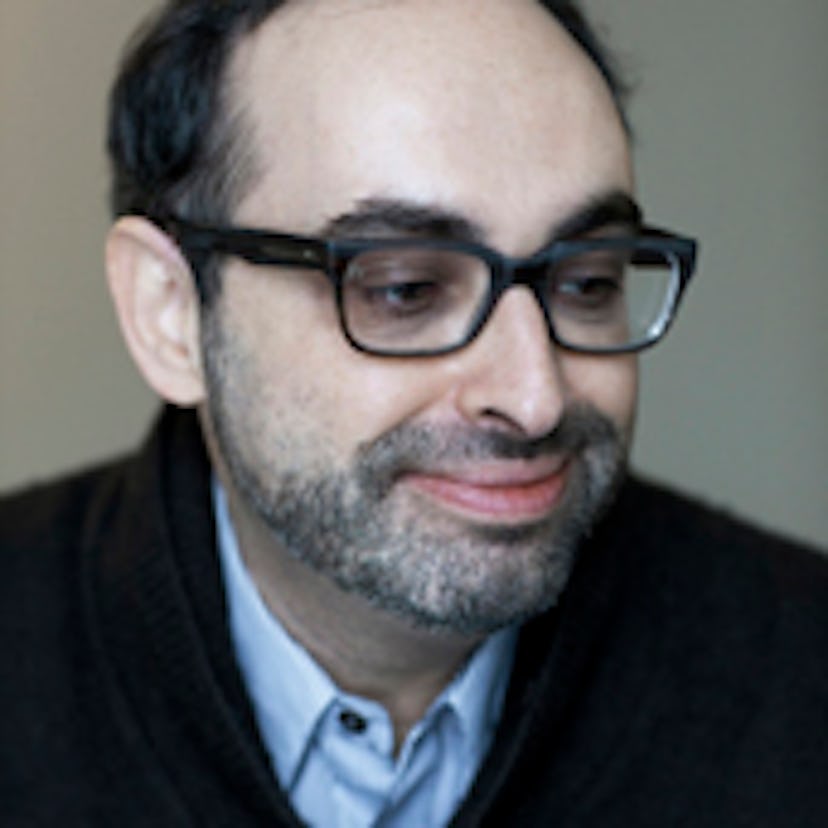Five Minutes with Gary Shteyngart
Put down whatever you're reading right now: this week Gary Shteyngart, author of The Russian Debutante's Handbook and Absurdistan, releases his third (and, in our opinion, best) novel, Super Sad True Love Story. A tale...

It’s so weird. When I started writing this it was 2006 and I had things like the collapse of banking and the collapse of the auto industry in the book. And of course as I was writing, these things started really happening. So I had to keep making things worse and worse.
You paint a bleak portrait of literacy in America—books are considered artifacts and college students major in subjects like Assertiveness and Credit. You teach at Columbia University; do you actually fear such a trajectory? Well the humanities are finished. Except at the very, very elite universities where you have the luxury of knowing that once you graduate a job awaits you, or at institutions like Oberlin, where I went—you’re not going there to make money; you’re going to, like, raise turtles on the Oregon coast. But at other institutions it’s finished. And it hits me in the gullet—this is my livelihood. I did a reading in a state—I won’t mention which state, but it’s redder than a tomato—and a student from the honors college of this particular state university raised her hand and said, “Mr. Shitgart, how do I know when a book’s been fiction-ated?” I was like, What?? She said, “You know, when it’s not true, because I only like to read true things.” I told her if it says “novel” on the cover, it’s probably been fiction-ated. You can’t make this stuff up.
One thing that endures in your dystopian America is religion. It will always survive. I’m not a religious person at all—I don’t really see the purpose of it. But now we’re beginning to do research into religion being connected to genetic coding. There are apparently some people who are predisposed to think there’s a higher power. It’s like alcoholism; you’re marked to believe. And some of us just have a much lower propensity. I live on the Lower East Side and there are a lot of Hasidic Jews there and some of them are just not marked for religion at all. One of them told me he’d take my last book, Absurdistan, and put it inside his prayer book. It’s the most profane novel, and he’d read it instead of praying. I thought that was great.
You come up with many hilarious, futuristic innovations in the book—for instance, onionskin jeans, which are basically transparent pants that have become all the rage among young women. I just love how every year summer comes around and people just get nakeder and nakeder. And when I started writing the ass crack had begun to make, like, a hugely aggressive appearance. I noticed it even among people I know who are fairly conservative. So I was following the ass cracks around for some time and I was like, well, what if we just turn this around a little bit?
You also concoct some amusing new acronyms that—in the vein of LOL—are a regular part of digital communication in the book. Like JBF—Just Butt-Fucking. I love that one! “Oh, I’m just butt-fucking with you, JBF!” One I used already exists—ROFLAARP: Rolling On the Floor Looking At Assorted Rodent Pornography. Another one that I made up was TIMATOV—Think I’m About To Openly Vomit. That one sounds like a Hebrew saying. I hope that one gets traction. JBF, too.
You did a satirical video advertising the book in which you costar with the writers Edmund White, Mary Gaitskill, Jeffrey Eugenides, Jay McInerney and your student at Columbia, James Franco. How did this come to be? I wrote it and my friend Doug Choi directed it. It helps to know all those people, so I just picked up the phone. Actually I’ve met Jay only once but he’s said really nice things about my work and it was very sweet—he came with a nice bottle of wine and I gave him a nice bottle of vodka. So it worked out well. And the video went really viral. Look, I’ve given up completely on the idea that the writer can be the person at home in that cozy study just writing away. Nowadays, you’re a persona as much as you’re a writer. You have to be out there, hustling this thing. I have this Facebook thing now, this Gary Shteyngart page you can go on and, like, “like me” or something. My publisher made me start doing it.
Which might be seen as particularly depressing, considering your characters in Love Story are slaves to technology and social media. That’s the thing: the web goads us all into becoming stand-up comedians, food critics… We’re doing everything for this thing and it wants everything we’ve got. How will we resist? It’s almost like a religious entity; we worship this thing, it knows everything and sees everything and is everywhere and nowhere at once. And the idea is that it’s neutral, but we know better. We’re all microserfs now, we’re all uploading information into this thing [Shteyngart picks up his own iPhone], so it becomes bigger than anything we do. And it’s ultimate purpose is what? To help some corporations better sell some products? It’s very disturbing. The bar is the only refuge, because at some point one is too drunk to effectively wield this machine.
In light of all this, how do you avoid constant depression? It’s possible to be much happier when you’re divorced from the truth. When you run into the truth head on—that the planet is killing itself, that culturally and intellectually we’re destroying ourselves, that our attention span is getting smaller and smaller—it’s horrifying. But if you can find a way to ignore all that stuff, then life is pretty good!